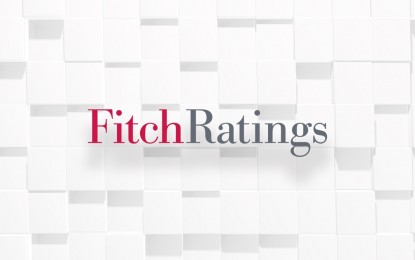
MANILA – Fitch Ratings on Thursday affirmed its BBB credit rating on the Philippines, but changed the rating outlook from Positive to Stable due to the negative economic impact of the coronavirus disease 2019 (Covid-19) pandemic.
“The affirmation of the 'BBB' rating reflects the Philippines' fiscal and external buffers, including its lower government debt/GDP (gross domestic product) ratio compared with peer medians and net external creditor position, as well as its still-strong medium-term growth prospects,” it said in a statement.
Meanwhile, it attributed the change in the ratings outlook to “deterioration in the Philippines' near-term macroeconomic and fiscal outlook as a result of the impact of the global Covid-19 pandemic and domestic lockdown to contain the spread of the virus”.
Fitch also revised its forecast for the Philippine economy for this year from six-percent growth to a 1-percent contraction.
It said this growth outlook “is uncertain” as the current global health situation remains fluid.
“Fitch projects the economy will contract this year, and that fiscal relief measures will contribute to a widening of the 2020 general government deficit by more than 3.5 percentage points of GDP,” it said.
Earlier in the day, the government reported a 0.2-percent contraction of gross domestic product (GDP) in the first quarter of 2020 due to the impact of the Taal Volcano eruption last January and the global pandemic.
Fitch forecasts private consumption, which has about 72-percent share in the domestic output, to be muted this year because of the government’s social distancing policy and the lockdowns.
Inflows from overseas Filipino workers (OFWs) are projected to post a negative 2.5-percent print this year. Remittances are among the key drivers of domestic output with a share of about 8 percent.
Tourism receipts, which contribute about 2.5 percent in domestic growth, are seen to contract by about 70 percent as a result of the ban for foreign tourists “before beginning to recover gradually later in the year.”
The debt rater expects government’s budget gap to widen to about 6.5 percent of GDP this year, higher than economic managers’ 5.3 percent projection, because of the government’s Covid-19 response
Borrowings are seen as the solution to finance the deficit, and Fitch expects the share of debt-to-GDP to rise to around 46 percent of GDP by next year but will also decline to 41.7 by 2023 “in line with the authorities’ intention to consolidate the deficit once the effect of the pandemic recede.”
In a statement, Bangko Sentral ng Pilipinas (BSP) Governor Benjamin Diokno said the structural reforms and sound economic management in the past provide the government monetary and fiscal space to face the crisis.
He said monetary officials “have been putting our elbow room to good use”, referring to the total of 125 basis points reduction in the central bank’s key rates and the 200 basis points cut in banks’ reserve requirement ratio (RRR) since the start of the year to ensure a healthy level of domestic liquidity and help boost domestic growth during the health crisis.
Diokno said the BSP is ready to use its full range of policy tools to buoy the domestic economy during the pandemic.
Finance Secretary Carlos Dominguez III said the country is “in a good fiscal position to deal with the unprecedented challenges posed by this contagion that has brought the global economy to the cusp of a recession."
He reiterated the government’s capacity to finance its Covid-19 response due to the prudent macroeconomic and fiscal policies along with the tax reform program and debt- management strategy.
"We are working with the Congress, the business community, and the rest of the private sector to build on the initial success of the government's policies by pursuing initiatives such as further investment liberalization and the remaining tax reform packages to lead our country to the path of a quick post-pandemic recovery and sustained high--and inclusive--growth," he added. (PNA)
